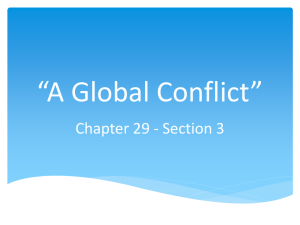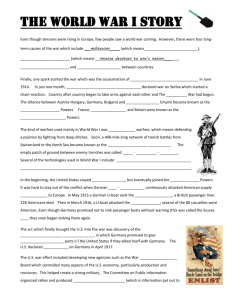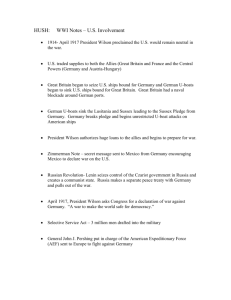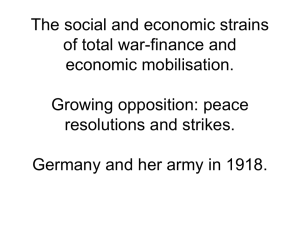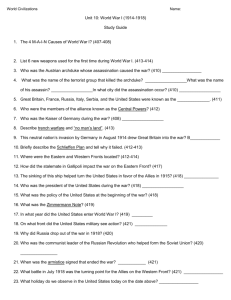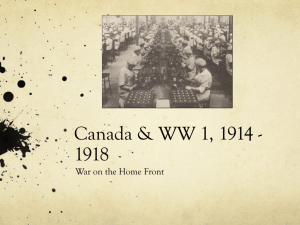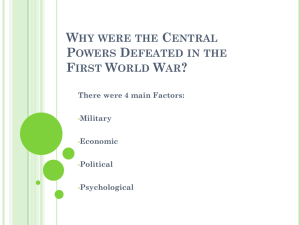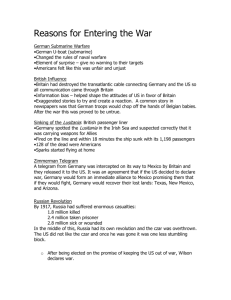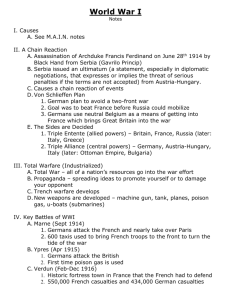Causes of WWI - Conroe High School
advertisement
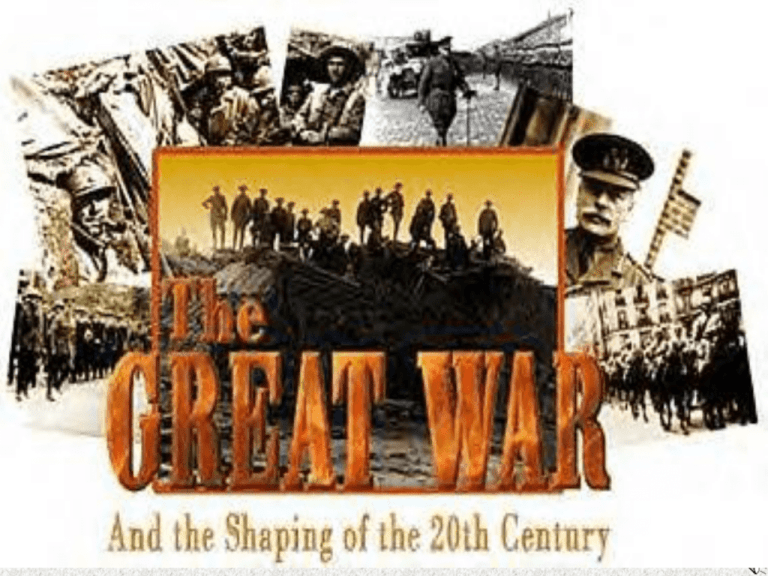
The Stage is Set for War 30 yrs of peace ends in Europe: Europeans had avoided war after the Napoleonic Wars Short wars increase confidence, national pride and willingness to form alliances Crimean War Franco-Prussian War There are four main reasons for World War I … 1. Nationalism “All’s Quiet on the Western Front”: Berlin students on the way to enlist in 1914 for a summer war. Nationalism • Goes beyond pride in your nation –More like ethnocentrism –My country is good – all others are bad Europeans came, they saw, they conquered … There was fierce competition for colonies: – Growing Industrial nations needed: • Colonial empires to provide resources & markets • “haves” vs. “have nots” 3. Militarism 3. Militarism- glorifying military power w/ prepared army Think “arms race”: 4. Entangling Alliances Wanted alliance systems to “balance power” – failed badly • Germany: P.M. Bismarck– 1887 – Triple Alliance: Germany, Ottoman Turkey, Austria-Hungary, & Italy; (Russia-nonaggression) • Shifting alliances: –Kaiser Wilhelm II (1918) dropped their Russian alliance & started ship building • 1907: Triple Entente: Britain, France & Russia Austria declares war on Serbia…. Triple Alliance vs. Triple Entente Germany Russia stays neutral until 1915 Italy Ottoman Empire Britain Bulgaria France Austria Belgium Central Powers vs. Allies U.S. 1918 Immediate cause of the war: “Powder Keg” of the Balkans: Serbia 1914 Assassination of Archduke Franz Ferdinand of Austria by the Black Hand 5. Crisis in the Balkans: the Powder Keg of Europe • Assassination of Austrian heir: –Archduke Franz Ferdinand & wife Sophie – June 28, 1914 @ Sarajevo • By Gavrilo Princip, Serbian radical • July 28, 1914 - Austria declared war on Serbia Assassination by the Black Hand Princip **Western Front Eastern Front Southern Front War Consumes Europe • Alliance system collapses: –Chain reaction- • Schlieffen Plan –Germany attacks France then turns on Russia –Germany invades Belgium & Britain declares war –2 sides: Good guys = Allies (Britain, France, Russia) –Bad guys = Central Powers (Germany, Ottomans, AustriaHungary, Bulgaria) Schlieffen Plan 1st Battle of the Marne 1914 Western Front: Stalemate = trench warfare • 1st Battle of the Marne: French & British hold Germany advance • Trench warfare: 1915 -1918 –Trench, barbed wire, “no man’s land” (field of artillery pot holes), –New weapons: poison gas, machine guns, armored tanks, larger artillery, planes, submarines Trench Warfare: Stalemate…. Or “Over the top” 1915-1918 Stalemate in the trenches! Eastern Front: Russian border • Central powers – – Tannenberg: German victory against Russia • Russia’s War effort weakens: 1916 – Non-Industrialized Russia – shortage of food, weapons, clothes, boots, blankets, etc – Extremely high casualties: 2 million+ Russians killed just in 1915 Czar Nicholas’s army: Peasant “volunteers” No supplies & no training….. Eastern Front: Russians: massive defeats Tannenberg, Lodz, Limanowa 1914; Galicia 1915 Results: 2 revolutions-1917 1. Czar Nicholas II removed and… 2. 1918 … White v. Reds Czar Nicholas to Kerensky to the Communists (Lenin) Treaty of Brest-Litovsk, 1918 War Affects the World Global conflict: – Fighting beyond Europe: • Dardanelles – 1915: Battle of Gallipoli –(see Mel Gibson’s movie) –Defeat of Allies – British T.E. Lawrence of Arabia – led Arabs in guerilla war against Turks • Germany lost: to Japan parts of China, Pacific Islands; to Britain – African colonies • Gandhi in India helped British 1915 Battle of Gallipoli, Ottomans v. Australian troops Beginning of technological warfare – Allies lose… machine guns vs. horses & infantry U.S. declares war: April 2, 1917 • Unrestricted submarine warfare 1917 – 1915: sinking of British Luisitania – 1917: sank 3 US ships • Feb 1917: Zimmermann Telegram – – Promised Mexico of all lost land • Traditional ties/ heritage w/ British 1917 Germany had 146 U-boats on patrol. Race for armament led to war…. The following section is a REAL situation that occurred in WWI… can you guess what? Read and decide what YOU would do… UC 44 Class U-boat: 1) Aft torpedo tubes 2) Electric motor 3) Main engine 4) Control room 5) Mine tubes 6) Forward torpedo tubes 7) Crew quarters Submarines were important in WW1. They gave the Germans some control over the British blockade. The war effort was suffering because of lack of supplies. If you were a sub commander in the North Sea in 1915. What would you do if… 1917, US Admiral William Sims Problem: You had to save ships in the submarine zone? German U-Boat: What would you do if you Didn’t have control of the seas like Britain? You are cruising on the surface off the coast of Britain. Suddenly you see eight destroyers bearing down on you. Choose one of 4 choices: 1. Full speed away. 2. Fire Torpedoes. 3. Quietly head for the bottom. 4. Move in and fire your deck gun. *Justify your decision... Next, you meet a small fishing v You have the same 4 choices: 1. 2. 3. 4. Full speed away. Fire Torpedoes. Quietly head for the bottom. Move in and fire your deck gun. What do you do??? Your orders say that at this time you should return home, but you have some torpedoes left and would like to try a location off the Coast of Ireland. What do you do??? You see a large passenger liner moving fast. It will pass near you. You are submerged. Do you fire torpedoes before the ship sees you? Or, do you warn it before you fire? Or, do you lie quietly and let it pass? Explain your decision... Congratulations! You just sank the Lusitania! The Lusitania, a Cunard passenger liner that was sunk by U-20 under command of Captain Schweiger on May 7th, 1915 off the coast of Ireland. 124 Americans were among the 1,198 casualties. The British steamship Lusitania is shown here departing from New York on its last trip in 1915. During this voyage a German submarine torpedoed the ship off the Irish coast, causing it to sink in 20 minutes; 1,198 people perished as a result; 128 Am. Notice! Travellers intending to embark on the Atlantic voyage are reminded that a state of war exists between Germany and her allies and Great Britain and her allies; that the zone of war includes the waters adjacent to the British Isles; that, in accordance with formal notice given by the Imperial German Government, vessels flying the flag of Great Britain, or any of her allies, are liable to destruction in those waters and that travellers sailing in the war zone on ships of Great Britain or her allies do so at their own risk. Imperial German Embassy Washington, D. C., April 22, 1915 Is this warning enough? Why? Homefront: U.S. • TOTAL WAR: all resources devoted to war against all of the enemy (including civilians) • Rationing: limiting of goods needed for fight the war (food for soldiers, gasoline, medicine, etc) • Propaganda: one sided information designed to persuade Rationing: Propaganda Women in the War • Olveta Culp Hobby (wife of Governor of Texas- created WACs) • Took over all nontraditional jobs –factory, shipbuilding, welding, construction, farming, etc Homefront: Women in Non-Traditional Roles American Women shipyard workers, WWI Allies win the war: • Russia withdraws from Eastern Front: Treaty of Brest Litovsk – By 1917: loss of 5.5 million soldiers, food shortages in cities, revolution – Return of Communist Leader: Vladimir Ilyich Lenin • March 1918: Germany – last major offensive on Western front – 2nd Battle of the Marne – won by US troops • Armistice: Nov 11, 1918 THE BIG FOUR: Paris…1919 left to right, British David Lloyd George Italian Vittorio Orlando French Georges Clemenceau U.S. Woodrow Wilson A Flawed Peace – Treaty of Versailles, Jan 18, 1919 • Allies’ Big Four: –President Woodrow Wilson- U.S. –PM Georges Clemenceau – France –PM David Lloyd George – Britain –PM Vittorio Orlando - Italy Wilson’s 14 Points: • Plan for world peace: – 1st 4 points: end of secret treaties, freedom of the seas, free trade & reduction of armies & navies – 5th: adjust colonial claims w/ fairness – 6th-13th: specific suggestions for changing borders & creating new nations – self -determination – 14th: League of Nations Anti-League of nations Actual Treaty of Versailles: HARSH, Revenge – June 28, 1919 • Created League of Nations • US – NEVER signed the Treaty – Isolationists until Pearl Harbor Europe Before & After War Chart: WWI deaths * * more effectively killed larger numbers of people : New Age of Industrial Technology & Zeppelins (dirigibles) & artillery Submarines Eddie Rickenbacker: US Ace 26 downs (4 balloons) *owner Indianapolis Speedway *president Eastern Airlines *writer Manfred Albrecht Freiherr von Richthofen He Shot down: 80 planes shot down & killed: April 21, 1918 GERMAN WWI ACE By 1917 there were: 17,700 gas casualties & 1 out of every 4 shells contained gas The Arms of Krupp This rail gun shot up to 30 miles! With less accuracy, This one shot up to 75 miles! War in the Industial Age! British tank Poison Gas warfare: outlawed after the horrors of this war! 240,000+ British war amputees When Johnny Comes Marching Home Again….. 1918 German General Ludendorff stages a final assault. General Pershing speaks to Americans: Leader of the AEF April 6, 1917: US Declaration of War Americans “Yanks” are “over there”…. *June 14, 1917 Pershing in Paris-1st words “Lafayette, we are here.” WAR TIDE TURNS: Victory for Allies *June 1, 1918 Chateau-Thierry *Sept. 1918 Argonne Forest -offensive Belleau Wood: June 6-25, 1918 “The Yanks are coming…” An Uncommon Heroine….carrier pigeons were used to communicate during battles… Saved the 77th US Infantry,under Major Whittlesey, -pinned by friendly artillery fire (later US won battle). Awarded French metal of valor, Cher Ami was shipped home on a luxury liner and given a ticker tape parade in New York! “The War to end all Wars”…. WHAT HAPPENED?
